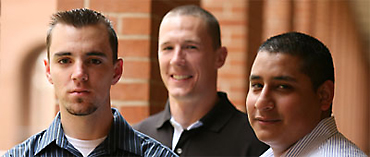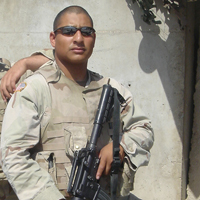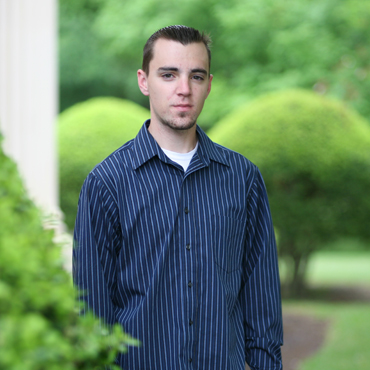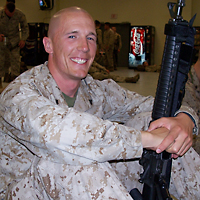Webextra: To Baghdad & Back
Those who spend each day on the campus of Baylor University may rarely give its stately architecture and manicured greenery a second glance. But to soldiers once surrounded by bullet-strafed buildings in Baghdad and rocky outcrops in the Afghan mountains, Baylor never looked so good.
Students Adam Torres and David Kaye, as well as recent graduate Patrick Warnick, all know the feeling of being a full-time student one moment and a soldier headed for a war zone the next.
Determined to finish their educations, these men also successfully navigated the tricky and sometimes emotionally trying territory of returning to student life.
Torres, 23, and his unit ended their streak of stateside duty when he was called up on July 4, 2004, after he had completed just one semester at Baylor.
"It seemed kind of surreal, even before we were set to leave," he says.
Torres had 48 hours to report for duty, but he also had to cancel classes and get out of an apartment lease he'd signed with friends. Despite the sudden change of scenery, "I was positive I would return," he said.
Gunner on a Humvee
A six-month training stint at Fort Hood was followed by 12 months of active duty in Iraq, where Torres, a specialist, served as a gunner on a team of three Humvees, providing support and protection on convoys to different camps around the Baghdad area.
He returned from Iraq in December of 2005 and re-enrolled at Baylor the following month. Torres acknowledges that his switch from military duty to life as a student required a little adjustment. "I figured I could just jump back in," he says. Instead, Torres chose to defer his return until this semester.
"I tried coming back and being the same person, but I grew up in Iraq -- I grew deeper in my faith." In Iraq, there was nothing he could put between himself and God, he says, and as a result he experienced "an intimacy" that allowed him to grow in his faith and cherish the life and education he has here.
Torres is on active reserve duty and says he hopes to either travel or enter graduate school after completing his undergraduate degree in international studies, which is partially paid for by the Army National Guard - about $3,000 a year.
Torres' time overseas also allowed him to receive credit for foreign language and health and human performance courses. As a soldier, his tuition likely would have been completely covered at a state university, but Torres remains dedicated to getting his education at Baylor.
"I just fell in love with Baylor," he says. "Being over there, a lot of the time I was yearning to be back. I never thought I could desire to learn so much," he says. "I appreciate learning on a greater level; it's something I cherish."
Helping to readjust
Among the personnel at Baylor that help students readjust to college life is Brandon Miller, assistant vice president of student success at Baylor's Paul L. Foster Success Center.
Miller says the center provides services to students who withdraw from school and intend to return at a later date. The center's efforts include what Miller calls "re-recruiting", where success center staff stays in contact with students who withdraw and who give an anticipated return date. They inform the students about registration and other academic issues, as well as letting students know when they should contact student records personnel and the University's Veterans Affairs coordinator.
Lured by small classes
David Kaye, 23, of Katy, decided to enlist after enrolling at Baylor in 2002 and completing one year of college.
"It was something I wanted to do - September 11 happened during my senior year of high school, and after my freshman year, I was ready to do it."
Kaye says his love for Baylor came after a visit to campus, where he was impressed by offerings like smaller classes.
Being a soldier also meant at least some of Kaye's tuition would be paid for; the rest is paid for with student loans, he says.
According to the VA coordinator for Baylor, Kay Eubank, approximately 125 veterans are enrolled.
Eubank's primary responsibility is to make sure all student veterans are enrolled in classes that will lead to the completion of their desired degrees. She also certifies their status so they can be eligible for benefits awarded through the GI and Montgomery GI Bills.
Under these bills, veterans who have met service requirement may receive up to 36 months of benefits to help defray the costs of their education. However, Eubank adds, many financial providers count military educations benefits as income, which can affect the level of additional aid a student can receive.
Kaye made it just about halfway through his degree plan before the Army came knocking mid-semester in the spring of 2005.
"I knew there was a chance I'd be called up," Kaye says, and having just two days to report left him unable to complete his coursework for the semester.
"I was able to withdraw from classes without failing, and Baylor credited me for those hours," Kaye said.
Working in Kabul
Kaye trained for three months before being deployed to Kabul, Afghanistan, to set up communications systems for bases in and around the city. The job may sound dull to some, but the time spent driving between bases provided more than enough excitement for Kaye.
"We traveled in regular SUVs" to avoid standing out the way Humvees might, Kaye says, but the lack of traffic regulations -- "there were no stop signs!" he remembers -- meant that vehicles in his convoys were involved in a total of 10 accidents during his 12-month stay.
Kaye's time to prepare for school after finishing his tour in Afghanistan was relatively short, he says, but he was ready to become a student again. "I had three weeks before school started." Kaye returned to student status in August 2006.
His time in the Army has actually helped him readjust to life in college, Kaye reports. His service "made working with other students a lot easier. It's helped me learn to work with different types of people."
A return and graduation
December 2006 graduate and Waco native Patrick Warnick began his career at Baylor after a stint at the University of Wisconsin, transferring in 2002 to study aviation sciences, and then refocusing on environmental studies and business administration.
Baylor's academic reputation and the proximity to family members made the University a good fit. Warnick was already a soldier, having enlisted in the U.S. Marine Corps a year earlier.
"I enlisted for a variety of reasons," Warnick says. "My patriotism and my family heritage -- and the thought of getting money for college." Toward the end of his school career, Warnick's education costs were defrayed slightly by his Marine benefits, about $300 a month. Student loan funds and Warnick's part-time and full-time jobs took care of the rest.
Warnick knew that being in the Marine Corps would probably interrupt his student life. "In the back of my mind was the thought of 'when will I go?' " he says.
After leaving school in the middle of the spring 2005 semester to serve a year at Camp Fallujah in Iraq, Warnick returned and picked up where he'd left off, for the most part without a hitch. "I think it's a matter of wanting to get back to the way things were before (deployment)," he says. "The biggest challenge is seeing how friendships and relationships change." Faculty and staff were welcoming and respectful and "bent over backwards" to help him enroll in the classes he still needed to complete his degrees, he says.
Once back in class, though, Warnick occasionally found his Marine Corps training seeping into student life. He noticed this when collaborating on group projects. "I'm a sergeant in the Marine Corps, and I supervise people. I would find myself trying to do that, but we're all answering to our professor!" he says.
Now on reserve status, Warnick says his deployment, age and upbringing all have contributed to his outlook on getting a Baylor education.
"I'm 28, and so I look at the world a little differently," he says. "I come from a different socioeconomic background (than many other students), and I sometimes wonder if they realize what a privilege it is to be here, and to be in this country."
"I've seen both the cruelties and the goodness in the world, and it's made me understand that there are equal parts of both."



